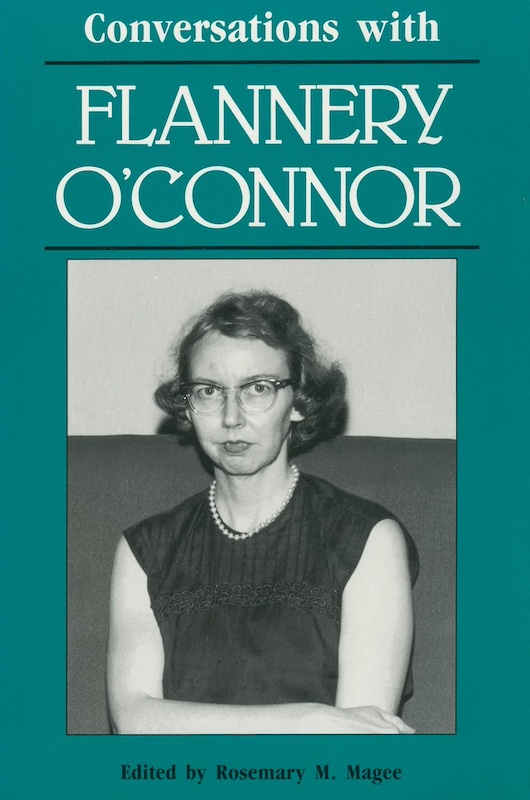“Tough-minded, laconic, with a marvelous wit and an absolute absence of self-pity, she made me understand, as never before or since, what spiritual heroism and beauty can be. There was nothing soft in it, no ‘radiance,’ no conventional serenity. She could be cutting, as in her remarks about certain writers she thought were frauds or about the kinds of stupidity she encountered in some of her admirers. She could exhibit impatience, doubt, pleasure in compliments, great distress at unfavorable reviews. But she was almost entirely free from calculation, from concern with what might be expected of her, and from any desire to question her fate or move into outrage.
“She went to mass every day, said grace, and wasn’t ashamed of saying ‘Our Lady.’ But as she writes in a number of essays in this book, her Catholicism was mainly a matter of belief in mysteries and in the perilous balance between grace and the despoliation of the self. She was the furthest thing from a moralist; I never heard her make a moral judgment that wasn’t first or at the same time a philosophic or an aesthetic one.
“She was extremely firm in almost all her judgments and possessed nothing of what we like to call an ‘inquiring’ mind. But this wasn’t the consequence of her Catholicism or of her being Southern, as some unsympathetic critics have argued. Being with her I had the feeling that just as her fiction cost some effort to go beyond its immediate exotic data, its local colorations, and apparently perverse violence, so she had to be seen as only tactically ‘narrow’ or unsophisticated. For one thing, her illness had put her against the wall, so that being interested in anything that wasn’t fiercely to her purpose in the small space she had to operate in was a rare luxury. Beyond this, she wasn’t being called upon to ‘know’ anything; she was an artist, and I think she was right in what she wrote in ‘The Nature and Aim of Fiction’: ‘there’s a certain grain of stupidity that the writer of fiction can hardly do without, and this is the quality of having to stare, of not getting the point at once.’ To write is to sacrifice what you think you know.”
— from Richard Gilman, “On Flannery O’Connor,” in Conversations with Flannery O’Connor, edited by Rosemary M. Magee (University Press of Mississippi, 1987)
Related reading and listening
- Learning from experience — Flannery O’Connor on belief and experience
- Hillbilly Augustinian — Ralph Wood on Flannery O’Connor’s refusal to adapt her fiction to the national temper
- The grotesque and the transcendent — Christina Bieber Lake on why Flannery O’Connor’s readers have to work
- Flannery at 100 — In honor of Flannery O’Connor’s 100th birthday, we have gathered here an aural feast of interviews with O’Connor scholars and aficionados discussing her life, work, and faith. (3 hours, 28 minutes)
- Insights into O’Connor’s development as a writer — FROM VOL. 160 Jessica Hooten Wilson discusses her experience studying and organizing Flannery O’Connor’s unfinished third novel, Why Do the Heathen Rage? (27 minutes)
- Prudence in politics — FROM VOL. 146
Henry T. Edmondson, III talks about Flannery O’Connor’s understanding of political life, which was influenced by a range of thinkers including Aristotle, Thomas Aquinas, Eric Voegelin, and Russell Kirk. (19 minutes)
- Flannery O’Connor and Robert Giroux — FROM VOL. 147 Biographer and priest Patrick Samway talks about the relationship between fiction writer Flannery O’Connor and the legendary editor Robert Giroux. (21 minutes)
- The dangers of the life of the mind — Robert H. Brinkmeyer, Jr., on why Flannery O’Connor encouraged the cultivation of “Christian skepticism”
- God is in the details — Flannery O’Connor on why stories rely on the particularities of reality
- The artist’s commitment to truth — Fr. Damian Ference, author of Understanding the Hillbilly Thomist, explores the depths to which Flannery O’Connor was steeped in Thomistic philosophy. (18 minutes)
- Flannery O’Connor and Thomistic philosophy — Fr. Damian Ference explores the depths to which Flannery O’Connor was steeped in Thomistic philosophy, as evidenced by her reading habits, letters, prayer journal, and, of course, essays and fiction. (48 minutes)
- At the trailhead of a long trek — Jessica Hooten Wilson on the discovery of a literary remnant
- Mars Hill Audio Journal, Volume 160 — FEATURED GUESTS:
Jessica Hooten Wilson, Kyle Hughes, Gil Bailie, D. C. Schindler, Paul Tyson, and Holly Ordway
- Art and the truth of things — Joseph Nicolello explains the origins and themes of his imaginary dialogue between Jacques Maritain and Flannery O’Connor. (28 minutes)
- Mars Hill Audio Journal, Volume 147 — FEATURED GUESTS:
R. Jared Staudt, Jason Peters, D. C. Schindler, Craig Gay, Mary Hirschfeld, and Patrick Samway
- Mars Hill Audio Journal, Volume 146 — FEATURED GUESTS:
Mark Mitchell, Hans Boersma, Henry T. Edmondson, III, Brian Clayton, Douglas Kries, Conor Sweeney, and Carole Vanderhoof
- Freedom and equality according to Flannery O’Connor — Three guests discuss Flannery O’Connor’s ideas: Henry T. Edmondson, III, on O’Connor’s understanding of political life; Ralph C. Wood, on O’Connor as a “hillbilly Thomist”; and Susan Srigley, on O’Connor’s sacramental and incarnational fiction. (18 minutes)
- How literature becomes a habit — Flannery O’Connor exhorts English teachers to maintain high standards
- Education as the formation of taste — Flannery O’Connor on the shaping of literary experience
- Hillbilly Thomist: Flannery O’Connor and the Truth of Things — Susan Srigley and Ralph Wood examine Flannery O’Connor‘s sacramental fiction and her understanding of the wisdom of limits. (60 minutes)
- Mars Hill Audio Journal, Volume 73 — FEATURED GUESTS: Richard John Neuhaus, Nigel Cameron, Carlos F. Gomez, Michael Uhlmann, Patrick Carey, John W. O’Malley, Patricia Owen, Susan Srigley, and Ralph C. Wood
